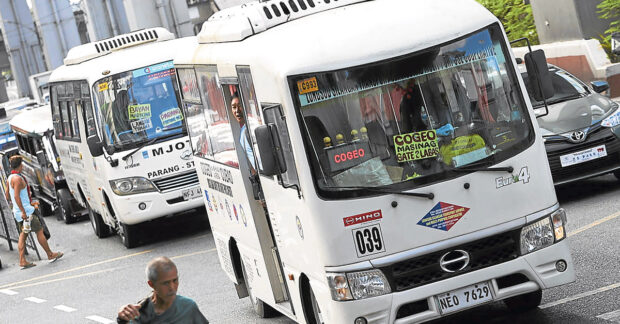
ALMOST THERE | Modern jeepneys wait for passengers in Cubao, Quezon City. (File photo by NIÑO JESUS ORBETA / Philippine Daily Inquirer)
MANILA, Philippines — The Land Transportation Franchising and Regulatory Board (LTFRB) said about 80 percent of public utility vehicles (PUVs) in the country have consolidated under the controversial PUV modernization program (PUVMP), a month before the extension given by President Ferdinand Marcos Jr. lapses.
LTFRB Chair Teofilo Guadiz III attributed the increase to the government’s determination to finally implement the program.
“Those who objected to the PUVMP have learned that their objection seemed useless because the government is determined to advance the program,” he said.
The 80-percent nationwide consolidation rate, however, was just 3.4 percentage points higher than the 76.6 percent (equivalent to 145,721 out of the more than 190,000 PUVs) the government announced back in January.
This happened before the president moved the consolidation deadline from Jan. 31 to April 30 to allow more operators to join transport cooperatives or corporations.
‘96% consolidation rate’
Guadiz said in the National Capital Region (NCR), the consolidation rate among jeepneys has already reached 96 percent. In other regions, it’s between 80 and 90 percent.
The 96-percent figure in NCR, however, only accounted for jeepneys that underwent the annual process of “confirmation” before the LTFRB, which is a requirement before a PUV unit’s registration, can be renewed before the Land Transportation Office.
If nonconfirmed jeepneys are included, the consolidation rate in the NCR drops to merely 56 percent, the lowest among all the 17 regions in the country. Based on last year’s data, there were more than 44,000 jeepneys in the NCR, of which merely half, or around 22,000, were confirmed before the LTFRB.
Guadiz was also confident of the recent ruling of the Supreme Court, which dismissed on technicalities a transport group’s petition challenging the constitutionality of the PUVMP.
READ: LTFRB: Over 70% of PUVs consolidated under modernization program
In a decision released last week, the high court did not rule on the merits of the petition for certiorari and prohibition filed in 2020 by Bayyo Association Inc.
Guadiz said they welcomed the high court’s decision “as it recognized the importance of the PUVMP in our efforts to modernize our public transport.”
“We are optimistic the two other pending cases against the PUVMP would get the same result,” he added.
There are at least two other petitions over the PUVMP that are pending before the Supreme Court, including Piston’s appeal for the issuance of a temporary restraining order and a writ of preliminary injunction to stop the enforcement of the deadline for franchise consolidation in December 2023.
The second petition was a motion for intervention asking the court to dismiss Piston’s plea. It was filed in January by pro-PUVMP transport groups, including Pasang Masda, Liga ng Transportasyon at Operators sa Pilipinas, Alliance of Transport Operators and Drivers Association of the Philippines, and the Alliance of Concerned Transport Operators.
‘Make commuting dignified’
Launched in 2017, the PUVMP aims to transform the public transport system in the country by making both commuting and public transportation operations “more dignified, humane, and on par with global standards.”
Also among its objectives was to “give a comfortable life for all Filipinos through providing a safer, more efficient, reliable, convenient, affordable, climate-friendly and environmentally sustainable transportation system in the country.”